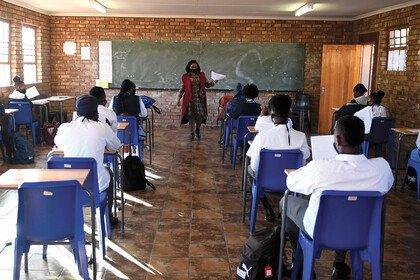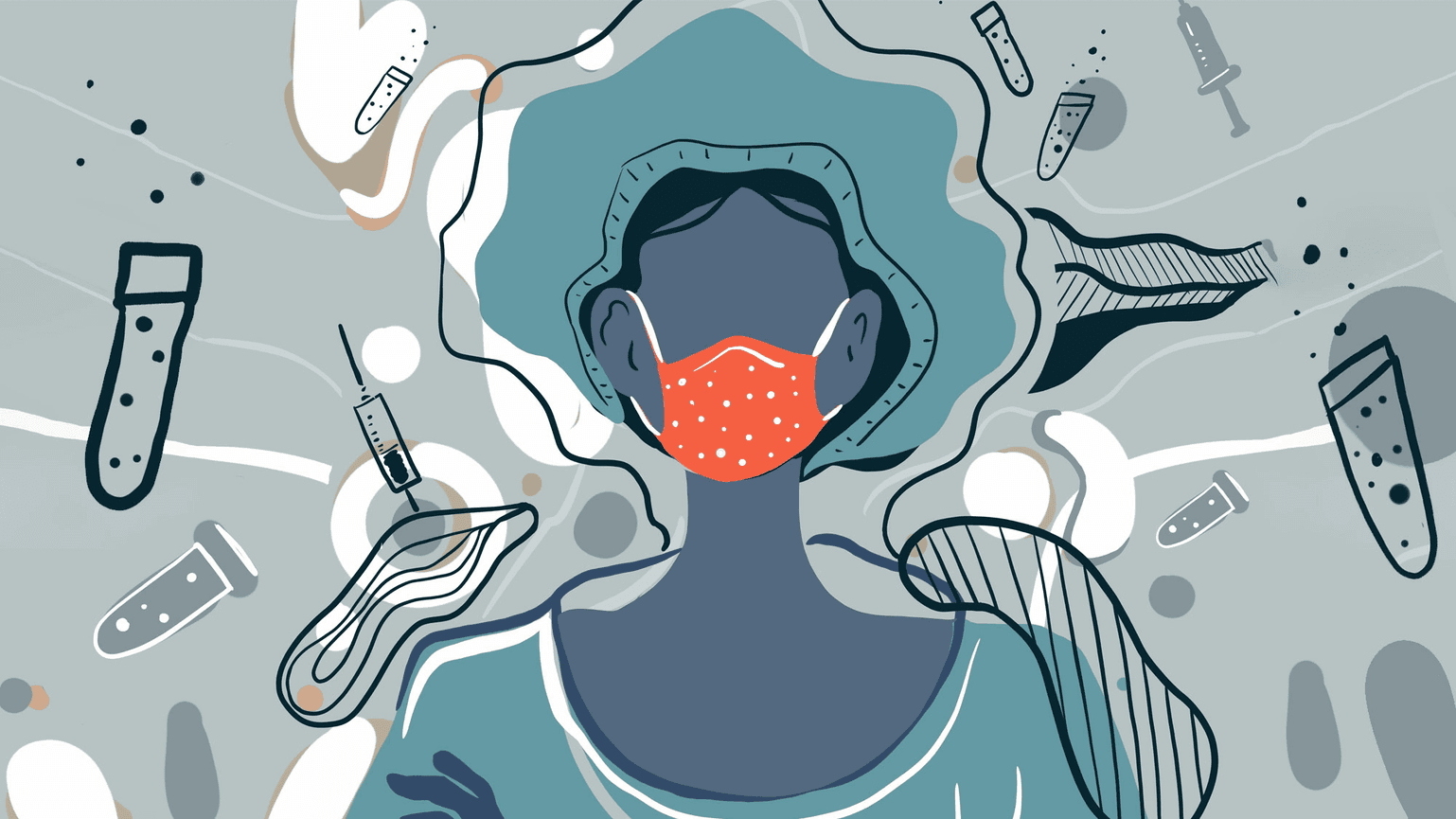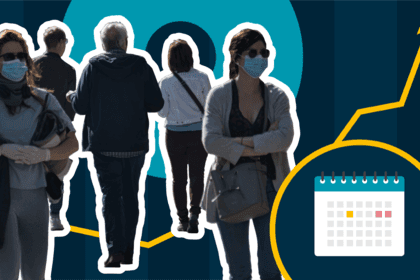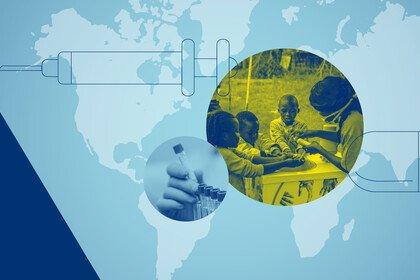
Working on the Covid-19 frontline: healthcare workers share their stories
Dr Charlotte Summers and Professor Rashida Ferrand have spent more than 18 months tackling Covid-19 at the frontline. We speak to them about their experiences, the impact Covid-19 has had on healthcare workers, and what must be done to prepare for pandemics in future.

J_art / Getty Images
Dr Charlotte Summers is an intensive care consultant based at Addenbrooke’s Hospital in Cambridge, where she’s been leading the ICU surge response to Covid-19. During the pandemic, she's been advising Dr Chris Witty, England's Chief Medical Officer, on which Covid-19 treatments should be tested in clinical trials.
Professor Rashida Ferrand works at Parirenyatwa Hospital, one of Zimbabwe’s largest hospitals and main teaching hospital. Last year Rashida set up its Covid-19 unit. She is now leading a country-wide programme, in partnership with the Ministry of Health and Child Welfare, that aims to improve confidence among healthcare workers treating the disease.
1. What has been your experience working on the frontline during the pandemic?
Charlotte: I started 2020 realising this train was coming towards us whether we wanted it to or not, and it was just a matter of time when it arrived. There's something exhausting about planning for something with so much uncertainty around it, and it was all consuming in March-April of last year. We spent last summer dealing with the consequences of the things that were put off to make room for Covid-19 patients. Then things started to deteriorate again, and we had the second enormous wave. It feels like things are calmer again now, but it's estimated there are about 5 million patients who need care that was postponed as a result of the pandemic. They're the unseen second victims of Covid-19.
Rashida: When you're faced with such an immediate existential problem, you can either cave in, or make do with whatever you've got and do your best. I know that doesn't sound like a very perfect solution. But that's what I'm sure many of us have done, within the resources, the context that we have.
The way we addressed Covid-19 in Zimbabwe was to start with the simple things that were feasible in our context, like getting fluid management and antibiotic stewardship right, making dexamethasone available, trying to get reliable and sufficient oxygen supplies, reassuring healthcare workers and developing rotas. The focus on trying to get critical care for or upscaling management of people who had very advanced Covid-19 was something that followed later.
Charlotte: You're absolutely right, simple things save lives. And even in the most advanced of intensive care settings, we know that simple things like good infection control and prevention via hand washing, distancing, wearing masks, getting the dexamethasone in – all of these small incremental gains add up to the majority of the benefit.
The other thing that we learned is that it's really easy to think we need this machine, or this presumed structure. But actually, it's the people that have saved lives, it's the staff who have stepped up and done things, because there was no other choice.
Rashida: When I started at the hospital, we had industrial action. There wasn't a blood pressure machine, there wasn't a pulse oximeter and we had flooding because the pipes were broken. AlI I know is that you always can do something. I'm not saying that to sound like a heroine, but because there are people who have done things. I've had doctors work 16 to 18 hours a day to try and get blood transfusion fluid, in the face of discrimination and stigma. But I think that we as human beings do have a sense of altruism. We are able to change things, maybe not to perfection, but if it was perfect, we wouldn't have anything to do. So I feel that, despite all the fatigue that many of us have experienced, people have reached out, worked together and made a difference.
2. How do you think Covid-19 has affected healthcare workers?
Rashida: At the beginning there was a lot of fear. People looking after patients with Covid-19 were worried that they would be next, and they were seeing people die. It's a really difficult thing when you equate what you do on a day-to-day basis with a huge perceived risk of dying. And in fact, it did happen. In the early months, healthcare workers had a disproportionately high mortality here in our setting in Zimbabwe.
I myself had this ethical, moral dilemma in terms of how can I expose somebody? And why should people come to work when they have daily existential crises to cope with, and then have to be quarantined and look after patients. There aren't any protective mechanisms for that. The heroism that we were asking them to display was just unbelievable.
Recognising, acknowledging and doing something about the mental health of your colleagues is important. We set up an initiative that was funded through various parties in the UK and the Canadian embassy to provide Covid-19 screening, integrated with screening for mental health and other morbidities such as hypertension, diabetes, TB and HIV. That gave healthcare workers somewhere to go, and there were lots of mental health referrals. We also crowdsource to make additional financial stipends available.
We have a trained team that understands the contextual issues of our setting and are now going out to decentralise Covid-19 care across Zimbabwe. I can't pretend we haven’t got a very high case fatality rate. 30% of our patients passed away in hospital. So it's difficult, but I think the fact that you do simple things, you're there for people, and you’re working together as a team – these are the things that matter most.
Charlotte: It was exactly the same in the UK. At the beginning people were genuinely worried, often for the first time in their careers, that going to work and doing their job might mean that they would die, or they would take something home that meant one of their family might die or get sick. And suddenly that changes everything about what you do.
The healthcare worker mental health studies that have been done in the UK show significant amounts of mental burden and anxiety, problematic drinking, distress, huge amounts of fatigue and moral fatigue. And we're in a well-resourced setting – if you look around the world at different settings, you have colleagues who have been under extraordinary pressure trying to survive in a healthcare system that is not functioning well.
3. We now have a range of Covid-19 vaccines, which is great news. But why is it important to carry on investing in treatments?
Charlotte: No vaccine for an infectious disease ever has been 100% effective at stopping people from getting sick. So even if we vaccinated the entire world tomorrow, people will still get sick from Covid-19. When you add on top of that there are people who don't yet have access to the vaccine and there are people for whom the vaccine is not a suitable intervention, we are always going to need treatments for Covid-19.
Rashida: It may also be that certain treatments are also not appropriate for certain groups. For example, dexamethasone is only to be used in the context of somebody with severe disease. If we can prevent people moving from mild to severe disease, that's a different type of approach.
We need to ensure that there are supplies and that they get to the right people. For example, when you go to hospital you think oxygen can be taken for granted. But to provide the amounts and volumes of oxygen that we have needed is no mean feat – from production to delivery and storage, the infrastructure and the systems needed to supply oxygen are huge. So it's not just ‘Yes, oxygen is there’, it's an incredibly complicated treatment to make available to individuals. These are all reasons why we absolutely need to invest in treatments.
4. Do you think more could have been done to ensure that healthcare systems across the world were in a position to deal with a pandemic? How can we better prepare for pandemics in future?
Charlotte: I think we need to have a very public and deep conversation around what it is that we are prepared to support and fund. Are we going to plan so that we never go through what we’ve been through again? Or are we saying that the cost of doing that is not what we're prepared to bear? In which case, we have to accept the consequences of millions of people dying.
What we need are vaccines, tests and treatments to be available to everybody who needs them across the world. And we need to get over the idea that this is impossible, because it's not impossible. It's a choice and we need to choose better. Long term, we need to build resilient healthcare systems. We need to have research infrastructures in place – and the mRNA vaccination technology may really help – so that next time, it doesn't take a year for us to get a vaccine for an emerging disease. The RECOVERY trial to identify Covid-19 treatments was started in nine days, which is extraordinary. Imagine if we planned so that next time it's not just one healthcare system that has something like RECOVERY, it's global. These are the things that have and will save lives.
Rashida: Time and time again, the issue of short-termism comes in. We're always just thinking about the immediate, short-term future of systems. Our approach to the way we do health, and our response to it globally, does not take into account that our demographic and epidemiological landscape is changing, and that climate change is having a huge impact.
We're in the 21st century, where there's an ageing population in many countries. We're undergoing an epidemiological transition, where alongside infectious diseases, we’re seeing a steep rise in chronic diseases. In Zimbabwe, our health services are programmed for acute events – you come in when you have a problem, you get something done to you and you go home. We’re going to see a completely different health morbidity profile in the next 20 to 30 years, compounded by climate change, which I still think is our greatest existential threat. We just haven't addressed how climate change is so intimately intertwined with the health and wealth of societies. I make a real plea for the global community to pay more than the lip service it has done in addressing climate change.
Charlotte: It’s also about the way in which we have set up our society. Zoonotic infections spread more readily in places where there's social and economic deprivation and crowded housing. All of these things, including economic productivity, are linked with wealth. The interconnectedness is not disease A equals therapy B. We can't keep ignoring that problem.
Rashida: Having a vaccine within a year, and to have had some efficacious treatments, like dexamethasone, is immense progress and a positive thing. But equitable access across the globe is a huge thing. We cannot think the way we used to about health in my country or health in your country. A variant that originates in one part of the world today we will find at the completely opposite end of the globe in 24 to 48 hours because we are so interconnected. We have to think of health in an interconnected capacity and about global delivery systems – not about diseases in terms of verticalised programmes and single biomedical interventions.
We've known for such a long time that a pandemic was on its way. And I'm sure the next pandemic will be on its way at some point. We need to think long term.
5. If you could say one thing to global leaders, what would it be?
Rashida: We are at war with an entity that is very clever and changing all the time. Unless we get societies and communities globally vaccinated, we are going to see the virus mutate, and it may mutate to become more resistant to what we have. So, we are almost chasing our own tails unless we make a really concerted effort to get what we have deployed in the most widespread, quick and effective way possible.
My most urgent message would be that we really need to look beyond our social, cultural, economic and political differences at a global level, and work together.
Charlotte: There is a narrow time window in which we need to act. Not supporting initiatives like the ACT-Accelerator is a choice. Not supporting getting treatments, vaccines and tests to the people who need them is a choice. All choices have consequences, and the consequences of this will be enormous and long-lasting. It's not just about health, it's about economics, it's about wellbeing, it's about social disruption on a global scale.



